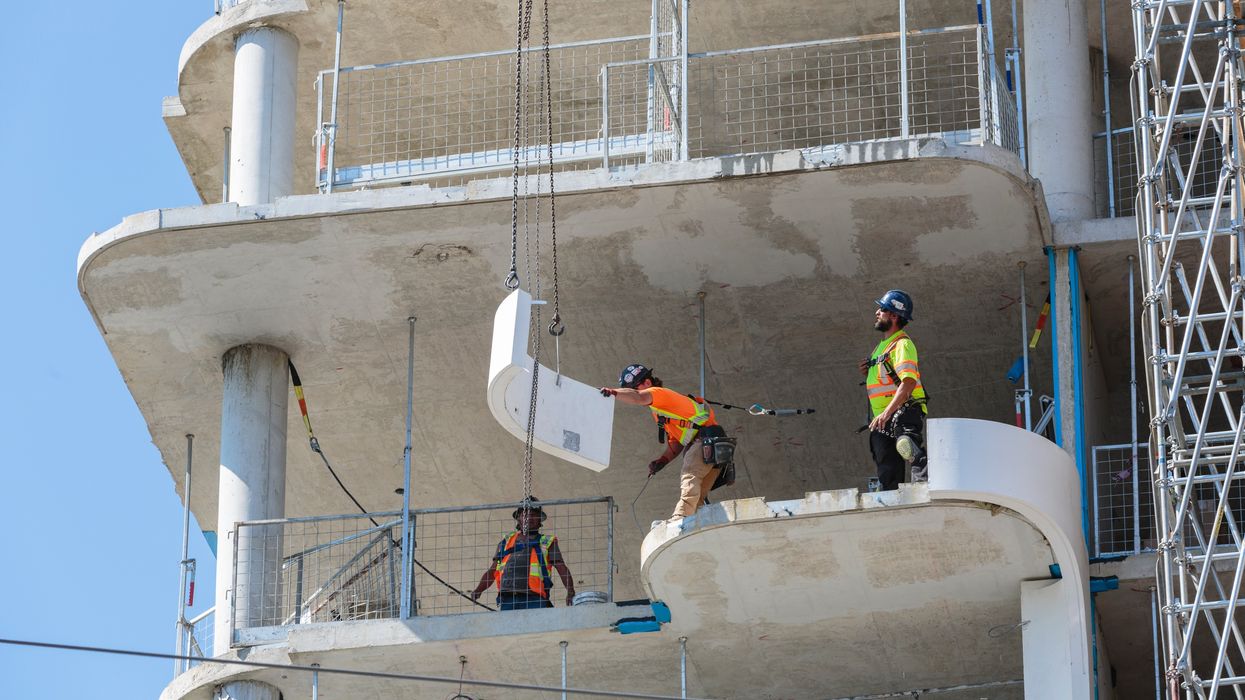Yesterday afternoon, over a dozen real estate and development experts were featured at the Residential Construction Council of Ontario's (RESCON) fifth annual Housing Summit, and talked candidly about the housing crisis and how to get residential construction back on track. This year's summit was aptly named "Embracing Transformation — Building Homes Faster" and was sponsored by LiUNA Local 183, Enbridge, Federation of Rental-housing Providers of Ontario, Toronto Regional Real Estate Board (TTREB), and EBS Global.
Leading a wide array of discussions included big names like Ontario Minister of Municipal Affairs and Housing Rob Flack, TRREB's Chief Information Officer Jason Mercer, and they tackled everything from automation and robotics in construction to policy changes needed to support more rental housing development.
The conference comes as Ontario is on track for its lowest annual housing starts since 1996, according to Canada Mortgage and Housing Corporation — a worrying trend that will result in massive job losses, a sizeable hit to the Ontario economy, and an unsustainable supply demand imbalance that will only make housing more unattainable for everyday Canadians.
"We, at RESCON, started this housing summit five years ago to track change. Many of the things that impacted housing five years ago are enduring and remain unresolved," said RESCON President Richard Lyall in his opening remarks. "Beyond the statistics, and above the compelling narratives, and outside of the ongoing message, is the most important part of all, and that's people. We're talking about young people who are losing the hope that they will ever be able to afford a home. We're talking about people who are increasingly unable to afford to live in the municipalities where they work. And we're talking about people who shouldn't have to decide between eating and paying their rent or their mortgage."
Dropping The "Delusions"
Following discussions about innovative construction techniques and an overview of the current political situation, Marlon Bray, Executive Vice President of Clark Construction Management, delivered a comedic — though blunt — assessment of Ontario's housing crisis. He delved into the province's looming housing supply shortage, or "drought," and how it will create an “affordability disaster” that decimates housing-related jobs, and forces more people out of expensive markets.
"We're about to face a massive challenge," he said. "Right now, if you think we don't have enough homes, fast forward two or three years, and it's going to be an absolute catastrophe."
Bray went on to identify several causes behind the current, and impending, situation including unnecessary "sin taxes" and fees on new homes, such as development charges and HST, which he likens to taxes governments put on cigarettes and alcohol.
"Believe it or not, [cigarettes and alcohol] are actually really good for you. They must be, because if they weren't bad for you, we wouldn't tax houses the same," says Bray. "We either have a tax distribution problem or homes are bad for you."
According to a December 2024 study from RESCON, taxes make up 36% of the price of an Ontario home, as these costs are passed along to end-users. That means $360,000 of a $1-million home is made up of these taxes and fees.
Broadening Options Key
Later in the afternoon, TRREB's Jason Mercer led a discussion on how economic uncertainty — think headwinds like tariffs, a decline in GDP and rise in unemployment, and interest rates — is shaping the housing market,
"Even with affordability improving, from a monthly payment perspective, there's a lot of households that do remain on the sidelines," said Mercer. "Because, you know, they're not sure where they stand in terms of their job, in terms of their income, vis-a-vis what we're seeing largely south of the border."
Looking ahead, he said, lower interest rates, increased affordability, and improved consumer confidence, alongside adequate supply in the longer term, will be key in getting the market on its feet again. When that time comes, Mercer thinks there will be significant pent-up demand ready to enter the market.
"As people start to move off the sidelines and back into the market, it's realistic that we start to see an uptick in home sales. And potentially, as we move through 2026, we could be seeing numbers approaching that 80,000 mark, which we haven't seen in a number of years."
Failing Grades
Finishing off the day, RESCON's Lyall and Founding Director of the Missing Middle Initiative (MMI), Mike Moffat, teamed up to discuss a joint report recently released by the two organizations called Q2 2025 GTA and GGH Housing Report Card: Starts, Sales, and Employment.
The report uses data from CMHC and Altus Group to grade 34 municipalities across the Greater Golden Horseshoe region based on housing sales and construction over the first six months of the year, relative to the first six months of the previous four years. According to their methodology, 22 municipalities received an F, five received a D, and the other seven municipalities received a C or higher.
"It's not exactly a stellar record given we keep having these repeated announcements, these media events, where checks are being handed out and all this stuff, and we're actually going in the wrong direction," said Lyall. "[...] But if we had the right alignment and will to change, we could do this."





















